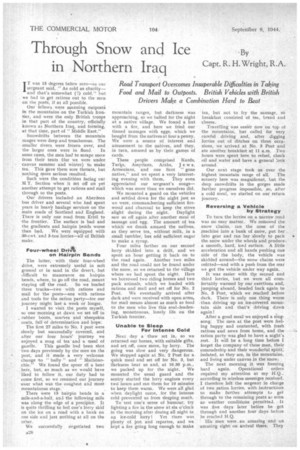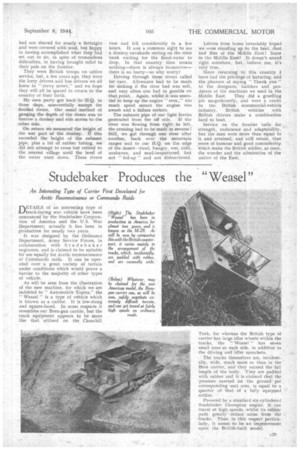Through Snow and Ice in Northern Iraq
Page 30

Page 31

If you've noticed an error in this article please click here to report it so we can fix it.
By Capt. R. H. Wright, R.A.
Road Transport Overcomes Insuperable Difficulties in Taking Food and Mail to Outposts. British Vehicles with British Drivers Make a Combination Hard to Beat
IT was 15 degrees below zero—as our sergeant said.." As cold as charity— and that's somewhat ( l) cold," hut we had to get rations out to the men on the posts, if at all possible.
Our fellows were manning outposti in the mountains on the Turkish frontier, and were the only British troops in that part of the country, officially known as Northern Iraq, and forming, at that time, part of " Middle East," Snowdrifts between the mountain ranges were deep and treacherous. The smaller rivers were frozen over, and the larger ones were in flood In some cases, the men had to scrape snow from their tents (for we were under canvas summer and winter) to make tea. This gave them sore throats, but nothing more serious resulted.
Such were the conditions facing our M.T. Section when it et off on yet another attempt to get rations and mail through to the posts.
Our drivers included an Aberdeen bus driver and several who had spent years in heavY haulage services on the main roads of Scotland and England. There is only one road from Erbil to the frontier. The surface is bad and the gradients and hairpin bends worse than bad. We were equipped with 30-cwt. 'and 3-ton lorries—all of British make.
Four-wheel DAIL
on Hairpin Bends The latter, with their four-wheel drive, were extremely useful in soft ground or in sand in the desert, but difficult to manceuvre on hairpin bends, where, to go off the road, meant
staying off the road. So we loaded three trucks—two with rations and mail for the posts—one with rations and tools for the ration party—for our journey might last a week or longer.
I wanted to visit the posts myself, so one morning at dawn we set off in rubber boots, scarves and sheepskin coats, full of determination and hope.
The first 27 miles to No. I post were slowly but successfully covered, and after our four hours' journey we enjoyed a mug of tea and a meal of gazelle. This gazelle had been shot two days previously by the men on the post, and it made a very svelcotne • change 'to " bully " and " Machono chic. We found the spoor di a bear here, but, as much as we would have liked to follow it. our duty had to come first, so we resumed our journey over what was the-roughest and most• mountainous stage.
There were 13. hairpin bends in a mile-and-a-half, and the following mile was along the edge of a precipice. It is quite thrilling to feel one's lorry skid on the ice on a road with a bank on one side and just nothing at all on the other.
We successfully negotiated two mountain ranges, but darkness was approaching, so we halted for the night at a native village. We found a hut with a fire, and here we fried our tinned sausages with eggs; which we bought from the natives at four a penny. We were a source of interest and amusement to the natives, and they, in turn, amused us by their games of cards.
These people comprised Kurds, Turks, Assyrians, Arabs, J c w s, Armenians, and one Scot " gone native," and we spent a very interesting evening with them. They even appreciated our sergeant's songs— which was more than we ourselves did.
We mounted a guard on the vehicles and settled down for the night just as we were, commandeering sufficient firewood and charcoal to keep the stove alight during the night. Daylight saw us off again after another meal of sausage and egg. The amount of tea which we drank amazed the natives, as they serve tea, without milk, in a small tumbler; but add sufficient sugar to make a syrup.
Four miles farther on our second lorry skidded into a drift, and we spent an hour getting it back OD to
the road again. Another two miles and the road could not be found under the snow, so we returned to the village where we had spent the night. Here we borrowed two riding horses and two pack animals, which we loaded with rations and mail and set off for No, 2 Post. We eventually arrived after dark and were received with open arms, for mail means almost as much as food to the men who live this soul-deadening, monotonous, lonely life on the Turkish frontier.
Unable to Sleep For Intense Cold Next day a thaw set in, so we returned our horses, with suitable gifts, and set off, once more, by lorry. The going was slow and very dangerous. We stopped again at No, 2 Post for a quick meal and set off for No. 3, but 'darkness beat us and, at 10.30 p.m., we packed up for the night. We mounted the usual guard and the sentry started the lorry engines every twd hours and ran them for 10 minutes to keep them warm. We were all glad when daylight came, for the intense cold prevented us from sleeping much.
To test one's sense of humour, try lighting a fire in the snow at six o'clock in the morning after dozing all night in an ice-cold lorry I Yet there was plenty of jest and repartee, and we kept a fire going long enough to make tea, but not to fry the sausage, so breakfast consisted of tea, bread and cheese.
Travelling was easier now on top of the mountains, but called for very careful driving and, after digging lorries out of ditches on three occasions, we arrived at No. 3 Post and ate another breakfast at 11 a.m. Two hours were spent here to refuel, check oil and water and have a general :.00k around.
Our next stage took us over the highest "mountain range of all. The scenery here was magnificent, but the deep snowdrifts in the gorges made further progress impossible, so, after a cold meal, we started on our return journey.
Reversing a Vehicle by Strategy
To turn the lorries on a narrow road was no easy matter. We removed the snow chains, ran the nose of the machine into a bank of snow, put her into gear and ran her slowly to pack the snow udder the wheels and produce a smooth, hard, iced surface. A little acceleration and all hands pushing one side of the body, the vehicle was skidded around—the snow chains were refitted—and with a push from the rear; we got the vehicle under way again.
It was easier with the second and third lorries, but we were all comfortably warmed by our exertions and, jumping aboard, headed back again to No. 3 Post, which we reached before dark. There is only one thing worse than driving up an ice-covered mountain side and that's driving dawn again !
After a good meal we enjoyed a sing song: The men at the post were feeling happy and contented, with fresh rations and news from home, and the ration party was glad to have a night's rest. It will be a long time before I forget the company of these men, their comradeship and their wonderful spirit, isolated, as they are, in the mountains, and living under canvas in the snow.
The next morning it was freezing hard again. Operational orders required my attention at my H.Q.. according to wireless messages received. I therefore left the sergeant in charge of two ration lorries, with instructions to make further attempts to get through to the remaining posts as soon as weather conditions permitted. It was five days later before he got through and another four days before he reached H.Q.
His men were . an amazing and an amusing sight on arrival there. They had not shaved for nearly a fortnight and were covered with mud, but happy in having accomplished what they had set out to do, in spite of tremendous difficulties, in having brought relief to their pals on the frontier.
They were British troops on active service, but, a few years ago, they were the lorry drivers and bus drivers we all knew in " civvy street," and we hope they will all be spared to return to the country of their birth.
My own party got back to H.Q. in three days, uneventfully except for flooded rivers. Our usual method of gauging the depth of the rivers was to borrow a donkey and ride across to the other side.
On return we measured the height of the wet part of the donkey. If this exceeded the height of the exhaust pipe, plus a bit of rubber tubing, we did not attempt to cross but retired to the nearest village until the level of the water went down. These rivers
rose and fell considerably in a few hours. It was a common sight to see a donkey cavalcade resting on the river bank waiting for the flood-water to drop. In that country time means nothing—there is always to-morrowthere is no hurry—so why worry?
Driving through these rivers called for care. Allowance had to be made for sinking if the river bed was soft, and very often one had to gamble on. that point. Again, whilst it was essential to keep up the engine "revs.," too much speed meant the engiee was awash and a failure certain.
The exhaust pipe of our light lorries protruded from the oil side. It the river was flowing from right to left, the crossing had to be made in reverse! Still, we got through one river after another, back over the mountain ranges and to our H.Q. on the edge of the desert---tired, hungry, wet, cold, unshaven, and mud-bespattered, but not " fed-up and not disheartened.
Letters from home invariably hoped we were standing up to the heat, dust and flies of the Middle East! Snow in the Middle East? It doesn't sound right somehow, but, believe me, it's very true.
Since returning to this country I have had the privilege of lecturing, and the pleasure of saying " Thank you " to the designers, builders and producers of the machines we used in the
Middle East. They did a gruelling job magnificently, and were a credit to the British •cornmercial-vehicle industry. British vehicles with British drivers make a combination hard to beat.
Service on the frontier calls for strength, endurance and adaptability, but the men were Snore than equal to it and retained, and still retain, that sense of humour and good comradeship which make the British soldier, at once, the wonder, and the admiration of the native of the East.




















































